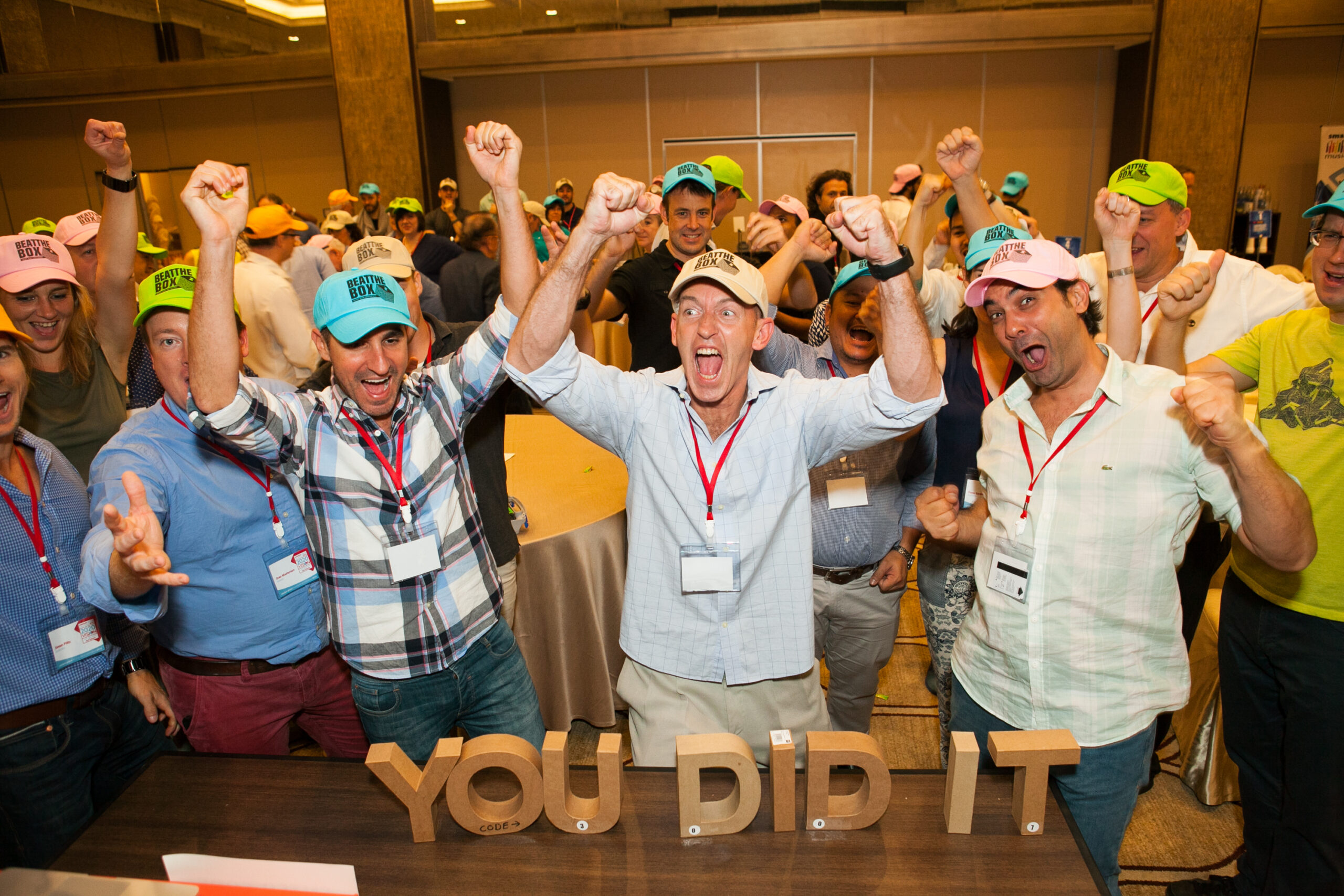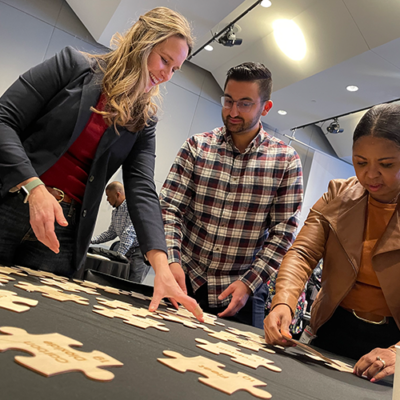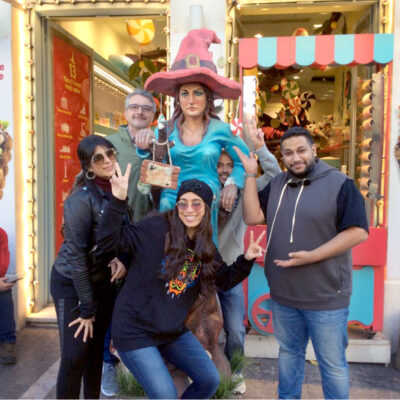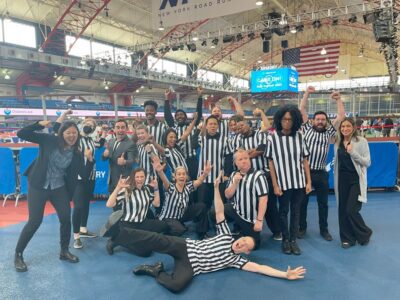Have you been told that your coworkers are not your friends before? Or have you heard people say there’s a big difference between real friends and colleagues?
These sentiments are often repeated in workplace culture, and while they’re not entirely false, they don’t fully capture the reality and potential of working relationships.
A 2024 study found that 81% of employees feel that workplace friends are highly important. Likewise, 83% say that having friends at work helps them feel more engaged.
In this blog, we’ll closely examine the importance of workplace relationships and friendships. We’ll also explore the importance of setting boundaries and managing competitiveness to maintain healthy office dynamics.
Boundaries Make Workplace Friendships Better
Boundaries are essential in any friendship, whether with colleagues or personal friends. They are also necessary for creating a psychologically safe workplace.
The proper boundaries can help you build solid friendships in the workplace, which has the potential to help you, your career, and the business itself.
What Are Boundaries?
Boundaries are limits that people create to keep themselves mentally, emotionally, and physically safe and comfortable. Here are a few examples:
- Not checking work email when you’re off the clock
- Not talking to coworkers about personal issues
- Setting clear expectations for availability with your boss
- Declining after-hours social events like happy hour if needed
- Avoiding venting about work frustrations with coworkers
- Separating work friendships from social media
- Not texting at night
Some might consider these insignificant, but setting boundaries and keeping a healthy work-life balance can make a huge difference in your mental and physical health. For this blog, we’ll focus on the mental and emotional aspects of boundaries.
What Happens Without Boundaries?
Without boundaries, it’s easy for relationships to go wrong quickly.
For example, imagine someone who doesn’t have boundaries when discussing family problems and relationship struggles with coworkers. This could easily make another employee uncomfortable, create an unprofessional vibe, and lead to tension.
Boundaries can be the difference between an unprofessional work relationship and a professional one.
Why Do You Need Boundaries With Friends and Colleagues?
It’s essential that employees have boundaries in the workplace. However, these boundaries should not create the perception that work colleagues are not your friends. Again, this isn’t necessarily wrong, but it misses the point.
Coworkers may not be the same as personal friends, but you can still have strong professional relationships that make work more comfortable, safe, and enjoyable.
For example, a boundary such as handshakes instead of hugs can make it clear that you have a professional relationship that shouldn’t become too personal. If you feel that hugs are reserved for close friends, this can help you mentally separate the two.
Boundaries also help when it comes to trust in the workplace. If you and your coworkers have clear boundaries, you can trust they’ll be professional. You don’t have to worry about them saying things they shouldn’t, getting too personal, or being unprofessional.
Managing Competitiveness Without Hurting Relationships
Competitiveness is a natural dynamic found in the workplace. It’s simply a byproduct of the working environment.
A competitive workplace isn’t automatically positive or negative. It depends on how you, your coworkers, and the leaders manage it.
Pros and Cons of a Competitive Workplace
Competitive office environments have advantages and disadvantages:
- Pro: Friendly competition can encourage people to work harder, be more creative, and increase productivity.
- Pro: Friendly competition can increase the potential for collaboration and allow supportive relationships to flourish.
- Con: Competitiveness can be at odds with creating an inclusive culture at work and forming relationships.
- Con: Competitive environments can make forming healthy and strong relationships difficult if coworkers put others down, gloat, or even sabotage their work.
If you’ve ever played a sport in school or a recreational league, you’ve likely seen these effects firsthand. It’s easy to get too involved in something and become toxic or negative toward others—in a workplace environment, that means your coworkers.
But it’s not all bad. In a professional sports team, for example, team members are undeniably competitive, but it’s focused in the right places. They work together to reach new heights and build stronger relationships. The same is true for workplaces.
How Different Personalities Affect Workplace Friendships
Everyone has different personalities, interests, and perspectives. No two people are the same, and that’s a good thing! The value of this diversity means different ideas, perspectives, and input in the workplace.
However, those differences sometimes hinder the formation of friendships and relationships. That’s why it’s so crucial to encourage open-mindedness among colleagues.
Drawbacks of Different Workplace Personalities
Although slight differences between friends and colleagues may seem insignificant, they can easily create problems in workplace relationships.
Something as small as preferring to work in a quiet environment rather than a loud and busy one can create tension among employees, making it difficult for them to bond and form strong relationships.
How to Make Differences In the Workplace a Good Thing
Creating a welcoming environment that encourages diversity, acceptance, open-mindedness, and understanding can help you avoid the drawbacks.
If your employees are open to learning about new perspectives and willing to try new things, building relationships in the workplace becomes easier.
For example, instead of one person being angry that their coworker often talks when they need silence, this person might ask for a small meeting to troubleshoot the issue. The team can then work together to create an environment where everyone’s happy.
Benefits of Encouraging Acceptance and Open-Mindedness
When you examine the idea that coworkers are not friends, you can find ways to troubleshoot differences in personalities and needs.
A company culture that encourages collaboration can significantly increase employee happiness. Employees want to feel comfortable and have good relationships with their coworkers.
After all, no one wants to wake up dreading their coworker interactions! By making it easier for employees to develop meaningful relationships, you can help them avoid burnout, improve communication, and boost productivity.
Your Coworkers Are Not Your Friends (and Why That’s Okay)
So, can coworkers be friends? Yes, but usually not in the same way you’d be friends with people outside of work.
You can and should be friends with your coworkers. However, your boundaries and the nature of the friendship will be different because it’s a professional relationship.
The same is true in reverse, though. Many people believe you shouldn’t go into business or work with your personal friends. This means boundaries to keep your personal friends out of your professional pursuits.
There’s nothing wrong with these boundaries in either direction. They allow you to stay close to your work and personal friends, minimizing relationship issues.
How To Encourage Friendships Between Colleagues
Employers and leaders must realize the importance of bridging that gap. Doing so can help your employees build meaningful and genuine professional friendships.
As mentioned earlier, boundaries are essential. Workers need to have boundaries to feel safe and comfortable with their working relationships.
You can set some boundaries on a business-wide level by making them part of your workplace culture. Other boundaries will vary depending on the individual.
Encouraging Clear Communication
Coworkers need to communicate clearly and openly—if you don’t, how will you know what boundaries need to be followed? Poor communication almost always leads to misunderstandings.
At TeamBonding, we use team building activities to help employees improve specific skills. Communication is one of the most popular skills teams want to focus on, and with good reason. Here are some of our favorite programs for improving communication:
- The Big Picture: In this event, your group produces a giant mural of many separate canvases. First, small teams collaborate to complete their own sections before they’re all assembled to reveal the final masterpiece.
- Beat the Box: This is the ultimate collaborative team building game. It’s a mind-bending series of escape room-style challenges that will bring out the best in any team.
- High-Tech Scavenger Hunt: In this event, tech meets teamwork to create a fantastic scavenger hunt! Using a mobile device and our custom GPS app, teams will navigate to various GPS hotspots to collect photos, videos, and other hilarious target items.
Improving Collaboration Skills
Another way to build those friendships is by helping your employees improve their collaboration skills. When teams can collaborate with good outcomes, they’re more likely to appreciate differences between colleagues.
This creates a supportive, inclusive culture to help bring people together with more understanding and awareness. Here are some of our favorite programs for building collaboration skills:
- Team PechaKucha: This event helps teams exchange broad and diverse ideas in a condensed time frame. This internationally renowned storytelling format creates an effective, impactful, and fun team building experience!
- Corporate Film Festival: In this program, team members will create a short film, design promotional materials, and walk the red carpet together. It’s literally an exercise in teamwork to make the dream work.
- The Infinite Loop: In this event, teams experience the magic of VR (virtual reality for the uninitiated) as they rescue a prisoner trapped in a virtual world. It’s all about fun, friendly competition, and fast-paced teamwork.
Friends and Colleagues: Why Workplace Relationships Matter
The belief that coworkers are not your friends can be harmful when it causes people to avoid workplace relationships. When people make work friends and colleagues feel comfortable together, everyone benefits.
According to a 2022 Gallup report, employees with a best friend at work are significantly more likely to be more engaged, productive, reliable, innovative, and collaborative.
From a business perspective, those are all things that benefit the workplace. Beyond the numbers, it’s important to prioritize your employees’ happiness and mental health. Happy employees are better employees, though, so this also has benefits.
Workplace Friendships Are Essential
Workplace friendships play a big role in employee happiness and mental health. That same Gallup report also found that employees with workplace friends were also happy and more excited to come to work.
That’s just common sense, right? After all, humans are social creatures, and we want all to feel supported and cared about.
If you don’t have friends in the workplace, you are less likely to feel supported and cared about. Workplace friendships provide employees with support and care, helping them be their best selves.
Help Your Employees Build Strong Workplace Friendships
People have long thought your coworkers are not your friends, but that isn’t completely true. Coworkers are not friends in the same ways they are with people outside of work, but friendship comes in many forms.
Having meaningful and professional friendships in the workplace is key to success. It offers a range of benefits on all levels, and if you want these perks, helping employees build friendships in the workplace should be a priority.
If you’d like to invest in your employees to help them build friendships and feel happier, team building exercises are where it’s at! Sure, we might be a bit biased, but the results don’t lie.
Team building events offer opportunities to learn more about coworkers, improve collaboration and communication skills, and form bonds.
Are you ready to promote friendships in the workplace? TeamBonding is here to help! We offer a range of events and activities perfect for enacting change in the workplace and building strong bonds.
Message us today! We’ll create a custom event to meet your goals—from better communication to improved teamwork and beyond.

















